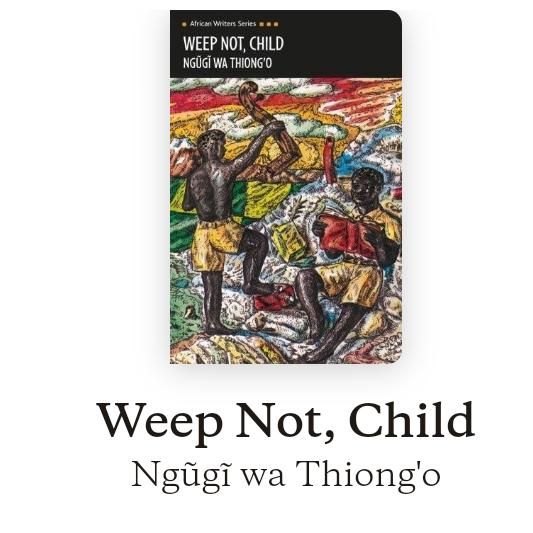By Jones Gadama
Ngugi wa Thiong’o, a towering figure in African literature, has left an indelible mark on the literary world with his profound insights into the complexities of colonialism, identity, and the human experience. Among his many celebrated works, “Weep Not, Child” stands out as a poignant exploration of the loss of innocence amidst the backdrop of political turmoil in Kenya.
This novel, published in 1964, is not merely a story about a young boy navigating the challenges of adolescence; it is a powerful commentary on the socio-political landscape of a nation grappling with the legacies of colonialism and the quest for independence.

At the heart of “Weep Not, Child” is the character of Njoroge, a young boy whose dreams and aspirations are intricately woven into the fabric of his family’s struggles and the broader societal upheaval.
Ngugi masterfully captures the innocence of childhood, juxtaposing it against the harsh realities of a society in flux. Njoroge’s journey is emblematic of the broader Kenyan experience during a time when the nation was on the cusp of independence from British colonial rule.
Through Njoroge’s eyes, readers are invited to witness the complexities of loyalty, betrayal, and the quest for identity in a world that is rapidly changing.
Ngugi’s prose is both lyrical and evocative, painting vivid images of the Kenyan landscape and the lives of its people.
The author’s use of language is particularly noteworthy; he employs a rich tapestry of imagery and symbolism that resonates deeply with readers. For instance, the recurring motif of the land serves as a powerful symbol of identity and belonging.
The land is not merely a physical space; it embodies the hopes and dreams of the characters, particularly Njoroge, who sees education as a pathway to a better future.
However, as the narrative unfolds, it becomes evident that the land is also a site of conflict, representing the struggles between the colonizers and the colonized.
Moreover, Ngugi’s exploration of family dynamics adds another layer of depth to the narrative. Njoroge’s relationship with his parents, particularly his father, is fraught with tension as differing ideologies clash.
Njoroge’s father, a traditionalist, embodies the values of the past, while Njoroge, influenced by the promise of education and modernity, yearns for a different future.
This generational conflict is reflective of the broader societal tensions in Kenya, where the push for independence often led to divisions within families and communities.
Ngugi deftly navigates these complexities, illustrating how the quest for personal and national identity can lead to both unity and discord.
As the story progresses, the impact of colonialism becomes increasingly pronounced, culminating in a series of events that shatter Njoroge’s innocence.
The violence and chaos that accompany the struggle for independence are depicted with unflinching honesty, forcing readers to confront the harsh realities of a society in turmoil.
Ngugi does not shy away from portraying the brutality of the colonial regime, nor does he romanticize the fight for freedom. Instead, he presents a nuanced perspective that acknowledges the sacrifices made by individuals and communities in their pursuit of liberation.
The title “Weep Not, Child” is particularly significant, as it encapsulates the central themes of loss and resilience.
The phrase serves as both a lament and a call to action, urging readers to reflect on the consequences of conflict and the importance of hope in the face of adversity.
Njoroge’s journey is ultimately one of self-discovery, as he grapples with the complexities of his identity and the weight of his heritage. The novel challenges readers to consider the implications of their choices and the impact of history on their lives.
In addition to its thematic richness, “Weep Not, Child” is also notable for its exploration of education as a transformative force.
Njoroge’s desire to attend school represents a yearning for knowledge and empowerment, a desire that is emblematic of the aspirations of many Kenyans during this tumultuous period.
However, Ngugi also highlights the limitations and challenges that accompany this pursuit. The educational system, influenced by colonial ideologies, often serves to reinforce existing power structures rather than liberate individuals.
This critique of education as a tool of both empowerment and oppression adds a layer of complexity to the narrative, prompting readers to question the role of education in their own lives and societies.
Furthermore, Ngugi’s decision to write in English, despite his native Kikuyu language, speaks to the complexities of language and identity in post-colonial Africa.
While English serves as a means of reaching a broader audience, it also raises questions about authenticity and cultural representation.
Ngugi’s choice reflects the tensions inherent in navigating multiple identities, a theme that resonates throughout the novel.
The characters’ struggles with language and communication mirror the broader challenges faced by a nation grappling with its colonial past and striving for a cohesive identity.
As the narrative reaches its climax, the consequences of the characters’ choices become increasingly apparent. Njoroge’s journey is marked by moments of profound loss, forcing him to confront the harsh realities of a world that is often unforgiving.
The emotional weight of these experiences is palpable, as Ngugi deftly captures the complexities of grief and resilience.
The novel ultimately leaves readers with a sense of ambivalence, as the quest for freedom and identity is fraught with both hope and despair.
“Weep Not, Child” is a powerful and thought-provoking exploration of the intersection of innocence, conflict, and identity.
Ngugi wa Thiong’o’s masterful storytelling and rich prose invite readers to engage with the complexities of the human experience, challenging them to reflect on their own identities and the legacies of history. The novel serves as a poignant reminder of the enduring impact of colonialism and the resilience of the human spirit in the face of adversity.
As we remember Ngugi and his contributions to literature, “Weep Not, Child” stands as a testament to his ability to illuminate the intricacies of the human condition, making it a timeless work that continues to resonate with readers around the world.


